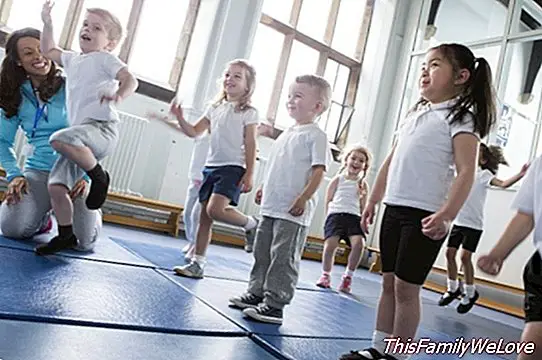Better physical condition, more intelligence in children

There are many phrases that remind us of the importance of being in shape. One of the best known is "mens sana in corpore sano"That is to say, tune up your mind in a body in good physical condition, but do the intellectual capacity and the state of form really relate? The University of Granada, UGR, has demonstrated this through a new study.
An investigation in which he has found a relation between a good state of physical form and a greater gray matter that allows to develop the Intelectual skills. With these data, parents are reminded that not only should they stimulate their children's minds, they should also bet on a healthier lifestyle to maximize the abilities of their children.
The aerobic capacity of children
In this investigation the UGR gathered more than 100 children with overweight and obesity. The objective was to analyze how the worst physical condition could pose a major problem when performing intellectual exercises. As explained by Francisco B. Ortega, leader of this work, "the level of physical condition of children is directly related to important structural differences in the brain".
The motives? As other studies have suggested, aerobic capacity it is usually related to a greater volume of gray matter in the brain of people. This means that in the two key regions for processing language and reading, the lower frontal rotation and the upper temporal rotation benefit from physical exercise.
"Physical fitness is a modifiable factor through physical exercise, and combining physical exercise that improves aerobic capacity and motor ability would be an effective approach to stimulate brain development and academic performance in overweight and obese children," suggests Irene Esteban-Cornejo, one of the authors of this study.
Given these results, UGR researchers suggest both parents and educators to remember the importance of physical exercise in the development of the youngest. On the one hand, those responsible for education policies are asked to give incentives such as Physical Education, often forgotten by other subjects "intellectuals".
On the other hand, parents are called so that they do not allow their children to join in a sedentary lifestyle, betting on physical activity on a day-to-day basis. This will not only improve health and prevent diseases traditionally attributed to obesity and overweight, but will also improve the intellectual capacity of the most little ones.
Exercise in day to day
Given the scientific evidence that keep in form report benefits both physically and intellectually, it is best to bet on a life that incorporates the exercise into the routine of each day. This does not only mean joining a gym or start practicing a sport, there are many practices that can bring great benefits with simple actions:
- Climbing stairs. The elevator is very useful when you have to climb to the upper floors of a tall building. But if the plant to which you must access with the child is not very high, and ported allows, a ladder is a better option.
- Visit to the supermarket. Walk through the hallways, take out the bags and bring them home. It is true that it is a low-intensity physical activity, but taking the children to the grocery store keeps them active and away from sedentary lifestyles.
- Think about the usefulness of the car. Like the elevator, the car can be a useful tool to reach long distances. However, why not do without it for short trips? Using your legs to go buy bread or to go to school, if it is relatively close, will bring great benefits.
- Use of free time. The weekend arrives, after a week of school the child will surely want to dedicate this free time to somewhat sedentary routines. Parents should encourage them to go to play in the park with their friends or the same family. The purpose is clear: avoid that these moments are reversed in front of the screen.
Damián Montero




